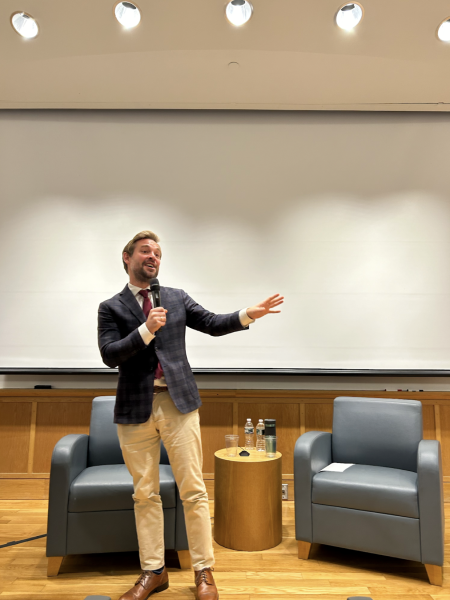Professor Whitney Hunt Explains Impacts of Genetic Ancestry Testing on Racial Identity
The Division of Social Sciences hosted a Luncheon Seminar Series titled “The Social Deconstruction of Whiteness: Genetic Ancestry Testing and White Identity Formation” on Thursday, April 20. Whitney Hunt — visiting assistant professor of sociology and a scholar of gender and race — led the talk and explained her research into genetic ancestry testing to the audience.
Genetic ancestry testing can be used to provide information about where one’s ancestors may have come from and about specific familial relationships. This testing, however, can also pertain to the social deconstruction of whiteness, as Hunt described.
“The social deconstruction of whiteness is a framework that describes how white individuals make sense of their identity in an area where the category of white seems to be losing meaning,” Hunt said.
Hunt added that white Americans are more likely to take genetic ancestry tests than other races. She informed attendees that some white Americans exotify their test results, with others utilizing the tests to prove their whiteness in an effort to support white supremacy.
Erin Conway, administrator for the division of social sciences and organizer of these semesterly talks, explained the relevance of Hunt’s argument and research.
“Professor Hunt’s talk opened my eyes to why others are using genetic testing for, sadly not for good reasons,” Conway said. “These companies are misleading people with information in the results that are not scientifically accurate.”
Sophomore Hayden Masia, who attended the event, shared that Hunt’s explanations gave her a new outlook on genetic ancestry testing.
“I used to think that genetic ancestry testing might be a fun, science-based way to break down one’s identity. I had learned previously that race was a social construct rather than a scientific truth, so it made sense to me that there would be little insight to gain in terms of a ‘racial breakdown’ from genetic testing for those who seemed to know that they were white,” Masia said. “After this talk, I would definitely put less value on genetics in terms of how people form and understand their identities.”
Another audience member, first-year Olwethu Ezell, was able to connect knowledge from her anthropology class to Hunt’s talk.
“When speaking of whiteness in class we defined it to be a product of the stratification of societies, that existed as an unmarked category, benefited from white privilege, and is inseparable from white supremacy,” Ezell said. “These ideas proved to be central to Professor Hunt’s study in which Hunt examined how white individuals make sense of their identity in a time in the United States where white dominance, specifically white supremacy is becoming more widely recognized and the ‘salience’ of the culturally constructed white category is slowly chipping away. In the talk, the speaker remarked, ‘Participants of [genetic ancestry testing] don’t want to check white anymore, they want something more to tell of their story of their identity.'”
Senior Claire Dailey is analyzing genetic essentialist beliefs — the belief that racial groups and their defining core essences are solely determined by an individual’s genes — in young adults for her sociology thesis. She noted that attending Hunt’s talk was especially meaningful to her, as it related to a topic she has been thoroughly focusing on.
“I have never had a strong desire to take a genetic ancestry test and after learning more about them through Professor Hunt’s research I definitely do not want to take one,” Dailey said. “I was surprised to learn that your results can change over time, and that makes me feel like they are not very accurate. Overall, Professor Hunt’s research is very interesting. A lot of her interviewees’ interpretations and reactions to their results were concerning. But I think a great point that she made at the end was that having more conversations about the topic of genetic ancestry testing and spreading knowledge is a great first step to combat these concerning beliefs.”
While Hunt notes that the dangers behind genetic ancestry testing are exposed through the understanding of the social deconstruction of whiteness, the testing can also expose significant family truths. Conway shared a personal story about her family’s relationship with the test, specifically, the findings that her sister uncovered.
“My sister was having a hard time tracing our family’s roots out of curiosity. What ended up happening shocked us all. The test said she had a family member she didn’t recognize. So my mom took it. Long story short, my mom found out her dad wasn’t her genetic dad. I hear this is happening to a lot of people. What I find interesting is that a younger generation is forcing secrets to be revealed in a different generation, and people are handling it in various ways. Thankfully, our families have embraced the situation, and more importantly, we are learning our correct medical history,” Conway said.






